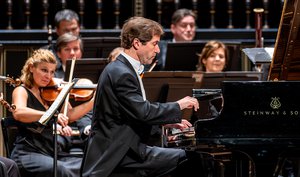Beethoven: Egmont Overture, op. 84
Beethoven: Piano Concerto in G major, no. 4, op. 58
Tchaikovsky: Symphony in E minor, no. 5, op. 64
Nikolai Lugansky piano
Conductor: András Keller

The Hungarian revolution and struggle for independence in 1956 became inextricably linked to Beethoven’s Egmont Overture, which could be heard almost on a loop on the radio as events unfolded. Therefore, the opening piece of our concert in October commemorates the revolution. In Goethe’s play, the protagonist, the Count of Egmont, a Dutch nobleman, led the Flemish War of Independence against the Spanish oppression and ultimately failed. The tone of struggle of the maestro born in Bonn also appears in his Piano Concerto in G major, which is probably his most lyrical, romantic and original piece. This stage is “inside” – in reference to the Prologue of Bartók’s Bluebeard’s Castle. The torment of the human soul (orchestral recitativo) struggles with the redeeming and relieving love (the cantilena of the piano) or as we can read it in one of Beethoven’s early monographs, it is Orfeo’s pleading against the cruel denial of the underworld. In Tchaikovsky’s Symphony in E minor, the emotional scale declines even more. The leitmotif-like, recurring knocking of fate is “a full yielding to the indecipherable order of fate or destiny” as the composer said. Although it somehow contradicts this thesis, there is a huge range of rich characters and varied musical thoughts to be enjoyed. The constantly changing appearances of the fate motif are instead mementos and warnings that interrupt the events.
